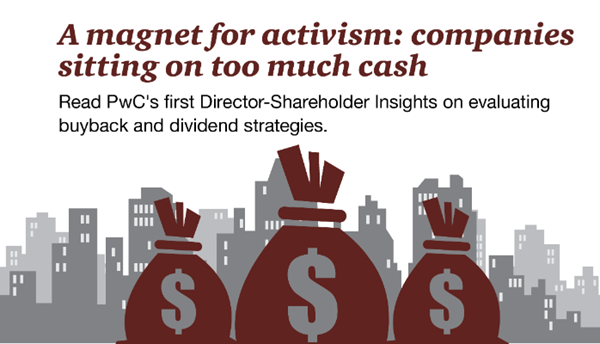
 |
|
 |
Paula Loop
Leader of PwC's
Governance Insights Center |
|
Thinking About Share Buybacks With Eyes
Wide Open
Mar 16,
2016
Three
critical areas that are always top of mind for investors when
discussing the board’s oversight role are the performance of the CEO,
the company’s strategy, and the company’s capital allocation plan. The
company’s capital allocation plan gets to the very center of the
long-term versus short-term investment debate. There is a rebuttable
presumption that most of the big institutional investors are investing
with a long-term lens, but there is also agreement among investors
that every company needs a balanced capital allocation plan that
addresses the needs of the company with both short- and long-term
elements.
At a high
level, this all seems very logical—until you throw into the mix the
$170 billion of assets under management with activist hedge
funds[1] and
the more than $1.4 trillion in cash on companies’ balance
sheets.[2]
That combination makes a very attractive target for activists that
want to direct some of this cash back to shareholders. One result we
are seeing: a record number of share repurchase programs, and with
that, a lot more debate on this topic.
Both
directors and investors need to be comfortable that they fully
understand the ramifications of a share buyback program and have
thought through any short- and long-term effects. Directors need to
clearly understand all of the downstream effects a share buyback plan
might have on the company’s key metrics that impact CEO compensation,
and investors need to understand the company’s equity and debt
structure, as well as any potentially adverse accounting and tax
implications of returning cash to shareholders. And, not to mention,
all parties need to understand the impact this form of capital
allocation has on available capital for other investments.
Continuous
and transparent discussions with shareholders allow the board and
management to get useful feedback that can help the company continue
to focus on its strategy. The capital allocation plan should be part
of these discussions, giving investors confidence that the company is
appropriately focusing on long-term value creation and not
unnecessarily hoarding cash on the balance sheet. An element of the
plan might be a share buyback program, but going into it with eyes
wide open is the best way to go.
For more
insights about returning cash to shareholders, read our first
Director-Shareholder Insights, “Is
cash burning a hole in your pocket? Thinking through share repurchases
and dividends.”
[1]
Activist Insight Annual Review
2016.
[2]
FactSet, Cash & Investment
Quarterly, December 21, 2015; http://www.factset.com/websitefiles/PDFs/cashinvestment/cashinvestment_12.21. |

